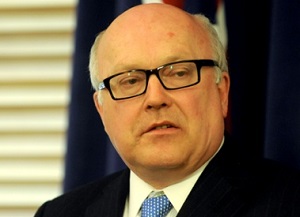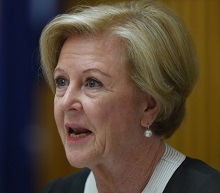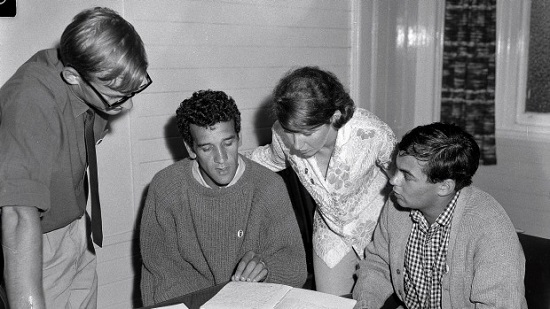Graeme Innes was a human rights commissioner under five attorneys-general from both sides of politics. He writes that George Brandis was the only one to question his integrity.
Innes was appointed in 2005 under Philip Ruddock, who said he must do the job “without fear or favour”.
I disagreed many times on policy issues with Howard ministers and staffers. Our discussions were sometimes “free and frank”, usually civil and never personal. My views were regularly questioned, my integrity was not.
Under Rudd Robert McClelland became attorney general. He said to commissioners:
Sometimes you’ll give us a kicking. Sometimes you’ll support us. That’s your job.
He took the Ruddock approach, sometimes questioning our recommendations, but never our integrity, as did attorneys-general Nicola Roxon and Mark Dreyfus.
Things changed under Brandis, he says. Now on the Triggs matter, Innes says:
Part of our democratic system, and the rule of law, provides that a key duty of any attorney general is to defend judges and statutory officers doing their jobs, because they are not in a position to easily defend themselves.
In attacking her, Brandis is not doing his job. Innes told The World Today:
“It changed under that of George Brandis, where the officers ourselves, the commissioners ourselves, the statutory officers ourselves were questioned, rather than what we were putting to the Government and the attorney from the perspective of the Human Rights Commission.
“Our integrity was questioned in the same way that Gillian Triggs’ integrity has been questioned in the last month.”
Yesterday Brandis’s peers in the Senate passed a no confidence motion in him, declaring him “unfit to hold the office of Attorney-General”.
The motion was supported by Labor, the Greens, the Palmer United Party’s two senators and Tasmanian independent Jacqui Lambie. South Australian independent Nick Xenophon and Family First Senator Bob Day both sided with the Government.
Brandis argued that the Human Rights Commission is not a court and not protected like the judiciary:
It should never be above criticism. No institution of the executive Government should be beyond criticism and beyond scrutiny. Not the ministry, not the public service, not agencies within the executive Government.
This Parliament should be a guardian, a fierce guardian of its rights to call members of the executive, and agencies of the executive Government into account.
On that basis it is the duty of politicians under parliamentary privilege to attack public servants who can’t defend themselves.
Michael Bradley, the managing partner of Marque Lawyers, says that Brandis has trampled all over the conventions that govern his own role as first law officer. In the the Westminster system the Attorney-General is supposed to have a higher duty, beyond politics, as the primary defender of the rule of law and our system of justice. He sees the HRC as included in the system of justice. It’s important that the HRC should be free to say what the Government does not want to hear. His bottom line:
If Triggs’s testimony is correct, the fact that Brandis sought to remove her from her position by offering her another job raises serious questions about his integrity. Where his actions leave us is in the untenable situation that his working relationship with Professor Triggs is irretrievably broken.
Consequently, one of them will have to go. It shouldn’t be her.
Denis Muller at The Conversation argues that The Australian newspaper has been running a concerted campaign on the Triggs issue. The paper’s position is ideological, he says, and inappropriate for the fourth estate.
ABC FactCheck has found Gillian Triggs’ assertion that in the first months of the Coalition Government the time children spent in immigration detention “was reaching quite exceptional levels” is correct.
Innes also criticised Tim Wilson’s appointment as human rights commissioner without a selection process and fresh from the Institute of Public Affairs, whose policy was to abolish the Commission. This left Susan Ryan covering disabilities as well as age discrimination, an unfair burden.
My earlier post is here.






